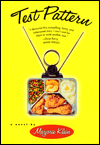
Okay, so I was
going to go off on my next adventure (
St. Pete Clay, specifically), but then Clemson put three touchdowns up on FSU and now I can't leave the television. I'll go to the studio tomorrow.
So... I guess I should write a review of
Test Pattern, by Marjorie Klein, which I read while on vacation.
I picked up this book at the used book store in downtown while wandering around down there one afternoon. I also picked up several other used books, and the total bill came to something like four dollars. So as you can see, this book didn't exactly cost a bunch of money. For what I paid, it was a good book.
It was Marjorie Klein's first book; she writes for the
Miami Herald and the book has a promotional blurb from Dave Barry on the cover. That's pretty high praise; I'll read anything by Barry and for the most part I'll read anything he recommends (say what you will, but I think Dave Barry's a better judge of literature than Oprah). That, and the cover of the book caught my eye. Bright yellow, with a picture of a TV dinner. The old kind of TV dinner, the kind that predated microwaves and that had those neutron peas that never seemed to warm up all the way (and seemed to exist in every compartment of the dinner whether there were peas in the dinner in the first place or not).
They say you can't judge a book by its cover, but that is in reality how we judge most books, and nearly everything else as well. And I'm not disappointed in this book. It wasn't bad. It wasn't remarkably good, but it had its own charms.
The central conceit of the book is that there's more in the tv test pattern than meets the eye--at least for one little girl. The book is set in the early 1950s or very late 1940s, in the early days of television. The family at the center of the book have just acquired their very first television, and the book's theme is the effect tv has on the family. As you might expect, the effect is not exactly a good one.
Marjorie Klein has done some very amusing things here. For one, each chapter alternates between the daughter narrator, and third-person narrator following the mother. This is pretty unique; I've tried to write stories where multiple characters each get to narrate, and the reason so few people can make this work (Faulkner aside) is that it's hard to get the narrators to be convincingly individual. Here, instead of having mother narrate herself, mother's chapters are written by a third narrator, but with a very limited point of view. I've never read a book that used this tool, and I quite enjoyed it.
The father, who is a key character in the story every bit as important as mother and daughter, doesn't get to narrate. Hard to say why exactly, but there are plenty of possible reasons. We never really get into his head, but it's clear enough exactly what sort of problems he's having, with his wife, with his job, with life in general. That he doesn't suffer from not having his own chapters is clear enough indication that Marjorie Klein knows what she's doing.
As I said, it was an enjoyable read, but not one of my favorites. The test pattern bit seems...silly, and frankly insignificant, until the moment comes in the story when it actually plays a role. And then, it feels a little... I don't know. You can't call it
deus ex machina, since she's set it up right from the start of the story. I guess it's just that, I never fully bought into the test pattern magic anyway. I have problems with magic in realist stories, and this is a very realist story. In fact, I almost wonder whether the magic is necessary to story at all--and until that one fateful moment late in the book where it does matter, it could almost be eliminated. So it feels as though this bit of magic is only in the book to save everybody there in that one crucial climactic moment.
That, and, there's a glaring error in the book that should have been picked up by a decent editor. At one point when snippets of
The Simpsons appear in the test pattern, Lisa's name is given as "Susie." Why Susie? It's a throwaway moment and thus no commentary is intended by the name change; it's simply an error, a bizarre error to be sure, and the sort of thing that editors are paid to catch. Then again, I do watch an inordinate amount of
Simpsons, since it's on twice every night as I'm cooking and eating dinner.
The main commentary in the story, about television's effect on this working-class family, is very well stated, and the book is worth reading because of that. Indeed, a lot of people who have less trouble with magic in realist stories would probably enjoy this book a great deal. As for me, it was... okay.

